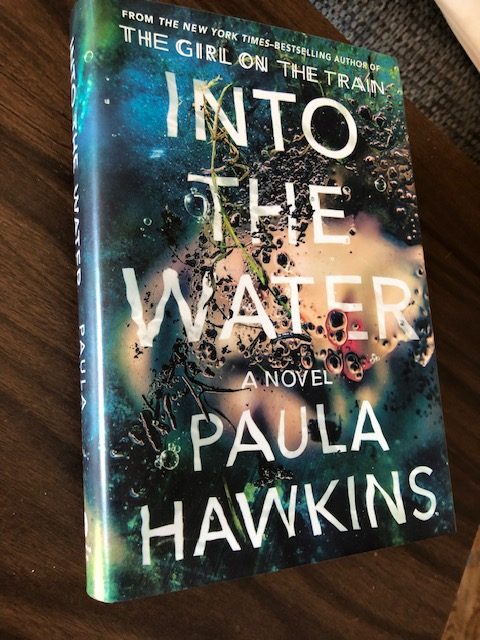Into the Water by Paula Hawkins
Riverhead Books, 2017, 1st edition hc
388pp, ISBN 978-0-7352-1120-9
A Review
by
Gene Stewart
Into the Water breaks free from all the constraints of typical thriller and commercial writing and does an amazing job of showing all the facets of how what we know is not necessarily so.
See, in Into the Water there are 11 narrators, each speaking to one of the others. Yes, the whole novel is in 2nd person, a kind of sublimated second person addressing not the reader but others in the story. It is layered and amazingly well done. Despite what inadequate reviewers have said, I found this effective, even revelatory. Bravura performance throughout.
Hand-holding a reader through plot intricacies is not what Hawkins is doing, nor is this intended to be a simplistic morality tale, as with too many mysteries. She’s not content with bringing normalcy back.
It’s never there at all, we soon learn.
Part of the point is the blur. Part of the metaphor is that we are all under water when it comes to knowing reality from story. Each person’s narrative mingles with everyone else’s tale to create a swirl of fact, fiction, and fancy. Hallucination, wishful thinking, and outright lying warp things further. It becomes murky, and icy cold, this squint toward reality.
As one reads, one is privy to the thoughts, feelings, and actions of an array of small town people both trapped in an over-arching narrative — that there is a Drowning Pool where witches were put to the water test — and a growing realization, sprouting from the seeds planted by an outsider come to investigate and write the town’s story. That produces a dread that, as this interloping investigative reporter phrases is, the Drowning Pool is more a place to get rid of inconvenient women.
Uh-oh, says murder and mayhem, that’s my cue.
Note, too, the extended metaphor of tossing the reader in, to sink or swim according to native abilities. She neither patronizes nor condescends. She tosses us Into the Water, and down we go.
Follow the bubbles.
In the way this novel offers no compromise, it reminds me of The Ruins by Scott Smith, written in real time with no breaks, start to end. It’s not done, editors cried. Can’t read it, critics wailed.
It’s a tour-de-force and stands as one of the premier horror thrillers of all time as a result of this uncompromising approach to the author’s vision.
The story line involves a woman who drowns in the Drowning Pool, a curve of river near the small town of Beckford, Northumberland. The water slows, deepens, with cliffs on one side and a pebble beach on the other. People swim there, or picnic. A dark pall of history hangs over the place for many in the town, too.
The drowned woman’s sister comes to town to take care of her niece, a teenager with distinctly weighty entanglements.
From there, through the inner voices of eleven different people, we first spot, then begin to untangle the intricate connections binding the town to the cold, wet darkness of the Drowning Pool. Witchcraft and wild accusations hover over and lurk under every word and action, it seems.
It is not a linear plot. Nothing is presented directly or, if it is, you won’t be able to tell it from the deflections and dissembling. Unreliable is not a narrator here so much as the world itself.
By the time it all becomes clear, if ever it does — this may depend upon the reading of the book, the slant of one’s trust in narration — we are left with an astonishing insight into the dark heart of a small town’s denizens, their foibles and frets, their inescapable legacies. Consequences are palpably thick in the air of Beckford, and we find the people living there, and dying there, genuinely vividly real. It’s an accomplishment, this novel, of which Paula Hawkins can be proud, and if it did not achieve the universal acclaim and tremendous sales of The Girl on the Train, her first novel, it certainly demonstrated to this reviewer an ambitious, largely successful reach into the literary thriller’s realm. Brava.
Recommended strongly only to those who enjoy highly literate, deeply serious, trenchant fun.
/// /// ///

